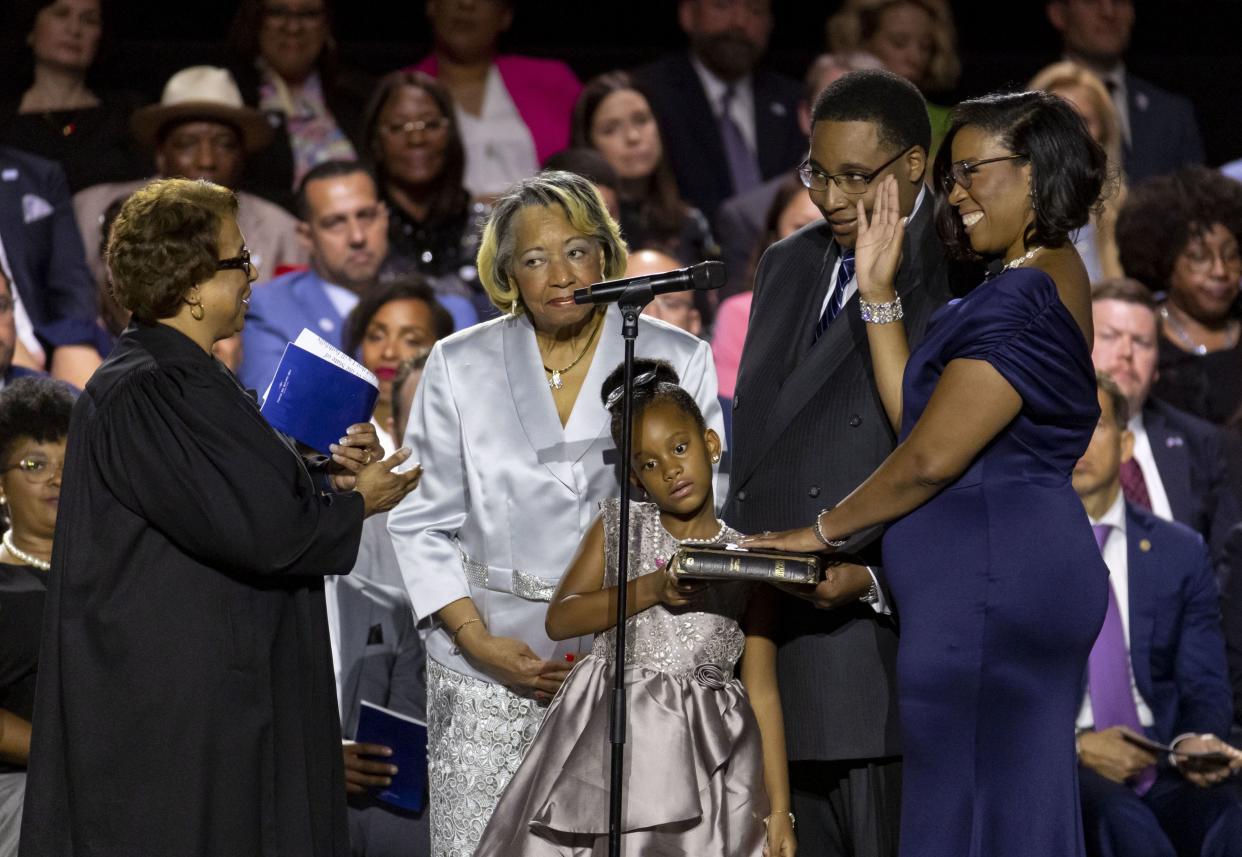Chicago Ethics Board defends handling of Melissa Conyears-Ervin allegations, refers such complaints to inspector general

- Oops!Something went wrong.Please try again later.
Less than a week after the release of a 2020 letter alleging Chicago Treasurer Melissa Conyears-Ervin abused her office, the head of the Chicago Board of Ethics said Monday the board handles all such complaints properly by referring them to the city’s inspector general’s office but that the board can’t do more unless it receives detailed findings from the IG.
Under questioning for days about why the board hasn’t acted on the letter even though it and the city’s Law Department received a copy of it in December 2020, Ethics Board Chairman William Conlon defended the board’s actions while also declining to discuss any case specifically.
“When the Board of Ethics receives a complaint that requires an investigation to develop more facts so that the board can act, the board, having no authority to investigate under the ethics ordinance, refers those matters to the Office of Inspector General. When a referral is made to the IG, the board administratively closes its case” and only reopens it if the IG refers the case back to the board, Conlon said. “The Board and staff have properly handled those referrals to the IG in all cases. … If the board of ethics receives a referral from the IG, we handle it as expeditiously as the matter allows.”
City Inspector General Deborah Witzburg declined to comment on the Conyears-Ervin situation.
Conlon’s comments came at the start of the Ethics Board’s Monday meeting and after the Tribune first reported last week the details of the letter, which was written by an attorney for two women Conyears-Ervin fired in 2020.
The letter alleged Conyears-Ervin abused her power, violated the state’s whistleblower act and misused taxpayer resources by using government workers to run errands for her, hiring a former police officer to be her personal bodyguard and pressuring public employees to hold events benefiting political allies, among other accusations.
The city, during Mayor Lori Lightfoot’s administration, kept the letter secret and fought requests for years by the Tribune that it be released. In late August Mayor Brandon Johnson’s administration decided to drop the efforts to keep the letter confidential.
The allegations against Conyears-Ervin and the lack of resolution highlights central weaknesses in the city’s internal system to mete out accountability. The Board of Ethics is hamstrung by a lack of investigative power and instead must rely on the IG’s office, which generally operates in secrecy until it releases quarterly reports.
In the case of Conyears-Ervin, the allegations against the city treasurer are years old and it’s unclear whether the IG’s office is in the midst of an investigation or conducted any investigation into the matter at all.
Conlon noted that once a referral to the IG is made, the inspector general may conduct an investigation and, if it does, can refer the matter back to the Ethics Board, the U.S. attorney’s office, the Cook County state’s attorney or the head of the appropriate city department.
But it isn’t unusual for the inspector general’s office to hold onto cases for years, raising concerns about the timeliness of its probes. In its last quarterly report, the inspector general’s office noted 136 out of 242 pending investigations in its office have been open for more than a year.
That slowness was a point of friction between Lightfoot and former Inspector General Joe Ferguson, who Lightfoot wrote in May 2020 with complaints about the office’s lack of timeliness.
Lightfoot argued dozens of cases were kept open for more than a year, raising questions about the office’s case management and also carrying “numerous risks.” Lightfoot said the slow pace of investigations led to a lack of due process for accused employees, delays in discipline and questions about how strong the cases were because evidence could be lost, inadvertently compromised or destroyed over an extended period of time.
“In investigations that involve potential criminal action where police intervention may be necessary, any delay which could create the perception in the workplace that the alleged conduct is not being taken seriously or being handled expeditiously can have detrimental impact,” Lightfoot wrote.
Although Witzburg on Monday declined to discuss specific cases, she acknowledged “investigative timeliness” has been a challenge for the office but said she has beefed up her investigative team to address the problem. During last year’s budget hearings, Witzburg raised the issue of resources for investigations and has increased staffing.
“We’ve identified a problem, we’ve implemented a solution, and we will report publicly on whether that solution solves the problem,” Witzburg said.
Chicago city ordinance also has tight restrictions on when an inspector general is able to comment on an investigation.
An IG can release an audit on inefficient or wasteful management, provide a statement noting allegations were not sustained if the subject of the investigation requests it, or publish findings in a quarterly report. That helps protect the confidentiality of investigations but also creates a situation where allegations against a public official can linger, leading some to question the effectiveness of the system.
Alisa Kaplan, executive director of Reform for Illinois, said “it’s disturbing that voters didn’t have the chance to consider the full scope of these allegations during Conyears-Ervin’s reelection campaign.”
“That’s largely on the Lightfoot administration for fighting to keep the letter detailing the allegations secret,” Kaplan said. “While it’s frustrating that the inspector general can’t comment because the public doesn’t know if action is being taken, there are good reasons for them not to comment on investigations. But the allegations are serious and if they turn out to be true, there’s no question that there should be consequences.”

